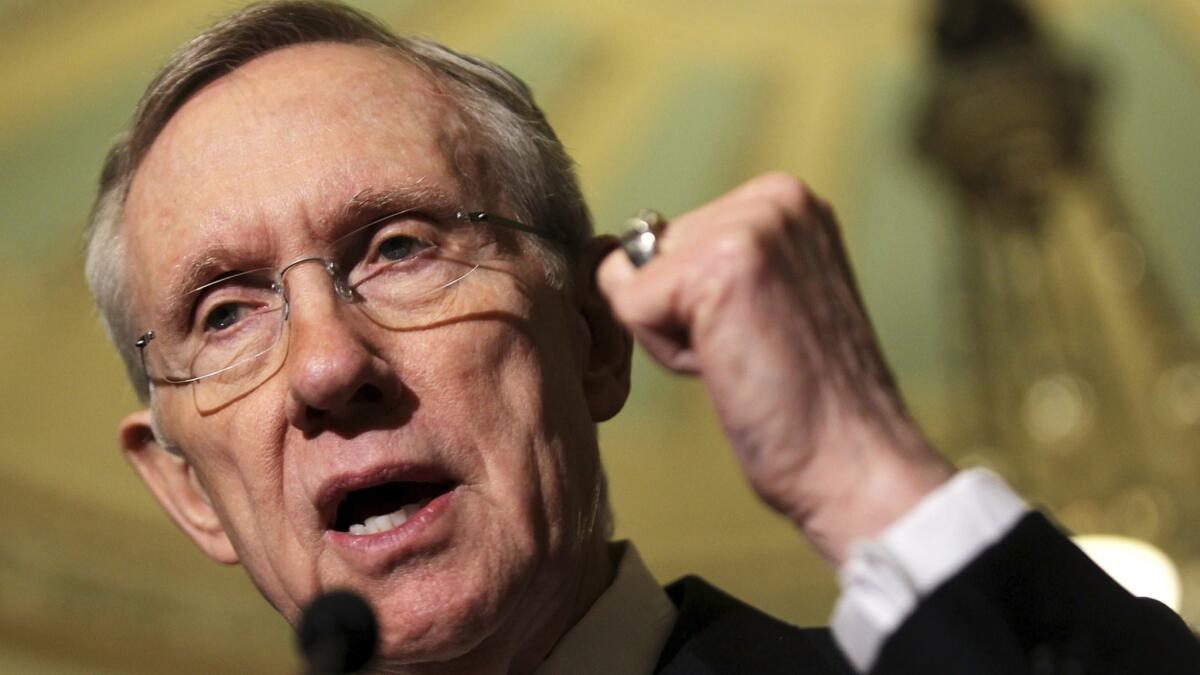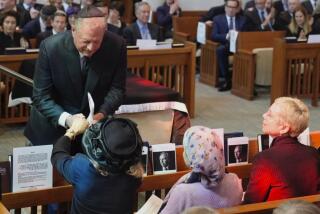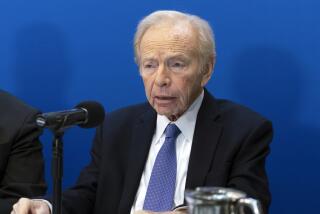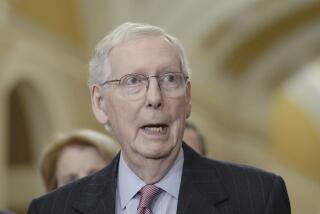Harry Reid, Nevada Democrat and former Senate majority leader, dies at 82

He grew up in poverty in a house made of creosote-soaked railway ties with no indoor plumbing. In his late 30s, after two high-profile failed runs at political office, he took on the job of heading Nevada’s Gaming Commission at a time when organized crime still held sway on the Las Vegas Strip.
The oddsmakers might have hesitated to bet on Harry Reid’s survival.
Yet he did more than survive. He became one of the most influential Democrats of his generation, whose shrewd political tactics helped turn Nevada into a reliably Democratic state and whose mastery of the Senate gave him a major role as majority leader in enacting the chief legislative accomplishments of Barack Obama’s presidency, including the Affordable Care Act, which he steered to victory without a single Republican vote.
Reid died Tuesday after a four-year battle with pancreatic cancer, according to a statement by his wife, Landra. He was 82.
His long career on the national stage — 34 years on Capitol Hill, including 12 as Senate Democratic leader — spanned an era in which Congress transformed into an institution deeply split along party lines. A former professional boxer with a pugilistic political style, Reid was well suited to the partisan combat of the early 21st century.
He was also an old-school power broker, less skilled at crafting media sound bites than at backroom dealing and parliamentary maneuvering.
Obama released a letter he’d written to Reid as his health faltered.
“You were a great leader in the Senate, and early on you were more generous to me than I had any right to expect. I wouldn’t have been president had it not been for your encouragement and support, and I wouldn’t have got most of what I got done without your skill and determination,” he wrote.
“Enjoy your family, and know you are loved by a lot of people, including me. The world is better cause of what you’ve done.”
Reid retired from the Senate just as President Trump was taking office in 2017. From the sidelines, Reid was blunt in his attacks against a president he bitterly opposed, at one point calling him a “human leech” on the body politic.
Trump benefited, however, from one of the biggest changes Reid made in the Senate — ending the filibuster for judicial nominations. That change in 2013 eased the way for Reid to confirm dozens of stalled Obama nominees, but it also opened the path for Trump to flood the federal court system with a wave of new conservative judges after he won office.
That Reid lived to an advanced age and left such a big mark on his home state and the nation was little short of a miracle, given the many risks he faced as he rose: He received regular threats on his life while serving on the gaming commission and worked in dangerous gold mines with his father as a young boy in the poor town of Searchlight.
“I’ve had a lot of stuff happen,” he told The Times in a 2019 interview.
Reid was born on Dec. 2, 1939, to Harry and Inez Reid, and from his early days there was no indication he was destined to become among the most influential politicians in Nevada’s history. Growing up in Searchlight, about 60 miles south of Las Vegas, he remembered a town that had seen its gold mining boom go bust and give way to prostitution as its primary economic driver.
“As a boy, I learned to swim at a whorehouse,” he wrote in his book “The Good Fight.”
“Nobody in town had ever seen such a fancy in-ground tiled pool in their lives as the pool at the El Rey.”
Poverty was a way of life in Searchlight, and the Reid family was no exception. One of four boys, Reid recalled sometimes going to work with his dad in the mines, but that wasn’t a life he wanted.
The outside world seemed foreign to him, and he filled that void by listening to baseball on the radio. Hearing Jackie Robinson play his first season with the Brooklyn Dodgers introduced Reid to the racial divisions of America.
“All I cared about was that in 1947, Robinson started in 151 games, batted .297, led the National League in stolen bases, and won rookie of the year. And that meant he was great in my book,” Reid wrote. “It wasn’t until a couple of years later that I began to realize the hell he had been put through doing it.”
Soon, Reid was looking to leave Searchlight, and when he enrolled at Basic High School in Henderson outside Las Vegas, staying with relatives and hitchhiking back home on the weekends, he began to see possibilities beyond the small town.
He was urged to run for student body treasurer his junior year, and it would be the first election he would win. He was elected student body president his senior year with the help of classmate Reynaldo Martinez, later his campaign manager, who would stick with him for much of his political career.
The high school would also be where he met two people who would have the biggest influence on his life: his wife, Landra Gould, and a teacher named Mike O’Callaghan, a Korean War veteran who became his best friend over the years and would eventually become governor of Nevada.
But first there was a short-lived boxing career in Cedar City in southern Utah, and then a fistfight with his future father-in-law before he and Gould eloped and were married by a Mormon bishop — even though neither were of that faith yet.
Reid wrote he was never religious growing up:
“In our little home, my mother had a navy-blue embroidered pillowcase with a little fringe on it, and she put it up on the wall. On it, in bright yellow stitching, it read, ‘We can. We will. We must. — Franklin Delano Roosevelt.’ And that was our religion,” he wrote.
That changed after Reid enrolled at Utah State University on his way to becoming a lawyer. With the birth of their first child in Utah, the couple converted to the Church of Jesus Christ of Latter-day Saints. Reid said he was drawn to Mormonism because of the kindness with which many church members treated him when he was enrolled at Basic High.
“Those popular Mormon kids were good to me,” he said. “They were nice to me. And I always remembered that.”
During his career, however, he would at times find himself pitted against the church’s leadership. As a Democrat, he was in the minority among the Mormon population.
He recalled when LDS leaders and the church bankrolled Proposition 8 in California, which denied marriage rights to gay couples. Reid, who was never afraid to speak his mind, said it was a colossal mistake and that the church “made fools of themselves” by backing the ballot measure.
Reid said he hoped that by opposing the measure he inspired other Mormons.
“I kind of bucked the trend, but I think it’s given people strength to do the right thing,” he said.
His political career wouldn’t take off right away. He spent some time in Henderson working as a lawyer in the 1960s before deciding to run for a seat in the Nevada Legislature. It was O’Callaghan who suggested Reid take his first crack at statewide office in 1970 by running for lieutenant governor when O’Callaghan ran for governor.
The two won, with Reid becoming the youngest lieutenant governor in state history at 31.
Two years later, he would experience one of the darkest days of his life, one which started out with one of his biggest highlights.
On June 22, 1972, Reid was attending a boxing match between Muhammad Ali and Jerry Quarry. Reid, who had fought a couple of dozen fights during his brief pugilistic career in southern Utah in his 20s, got to meet Ali before the fight. The two spoke for 90 minutes, and Reid said he felt like a kid meeting an idol.
After meeting Ali, Reid went to his office. He soon received a phone call. It was his mother.
“Your pop shot himself,” she said, as Reid later recounted.
Reid said he later came to grips with his father’s lifelong battle with alcohol and depression — both sources of shame for years and things he seldom talked about with anyone. In his book, he wrote: “I loved my parents very much. They gave life everything they had. But no child should be raised the way I was raised.”
He would bury his father in Searchlight. Two months later, his son Josh was born.
At the time, Reid’s political career looked to be stalling.
In 1974, after a single term as lieutenant governor, he decided to run for the U.S. Senate against Paul Laxalt, the former governor. Amid the Watergate scandal and President Nixon’s resignation from office, Reid recalled in his book that his pollster assured him it would be impossible to lose the race.
“I showed him,” Reid wrote. Laxalt won by fewer than 1,000 votes.
Floundering, Reid tried to run for mayor of Las Vegas, but lost that race as well.
In 1977, O’Callaghan asked him to head the gaming commission. Reid, who didn’t gamble, was uncertain at first but decided to take on the job. He described it as “an intense, surreal time when it sometimes felt as if I’d wandered into some kind of terrible fun house.”
He quickly drew attention for putting Tony “The Ant” Spilotro, an infamous and violent mobster, into the Black Book, the list kept by the state of those not permitted to enter any casino. Reid also got Frank “Lefty” Rosenthal into the Black Book, a moment made famous in the move “Casino.”
Reid said he always carried a gun and that his office in Las Vegas was regularly evacuated for bomb threats. At least once, his car appeared to be wired to detonate but didn’t because of a defective fuse.
He was asked to remain on the commission in 1982, but Reid declined and ran for Congress — a victory. Because Nevada only had one representative at that time, Reid was invited to caucus with the California Democrats and, over the years, forged a relationship with the state party and became friends with Nancy Pelosi, the chair of the California Democratic Party at the time of Reid’s election. Pelosi was first elected to Congress from San Francisco in 1987.
After two terms in the House, Reid ran for the Senate after Laxalt announced he would retire in 1986. He won and would continue to win, despite Nevada’s reputation as a conservative state and despite his own gradual shift to more liberal positions on some issues. He first came to Washington as a strong advocate of gun rights and opponent of abortion but moved left on those issues, for example, especially as he ascended into leadership posts and during the Obama presidency.
Reid’s stature in the Senate was bolstered as he became the whip and ultimately the minority leader when Sen. Tom Daschle of South Dakota lost his seat in 2004. Reid became Senate majority leader in 2006 when Democrats took control as the Iraq war sapped support for President George W. Bush and the Republican Party.
A tactician in the Senate, Reid grew to revere the rules and the body’s deliberative nature. Often he used those rules to block Republicans, who regarded him as a skilled obstructionist. But Reid also counted Republican colleagues as friends and sought compromise to craft policy.
He helped shepherd a number of bills into law, including a taxpayer bill of rights, a ban on storing nuclear waste at Yucca Mountain, a desert site not far from Las Vegas, and a law to ban female genital mutilation.
In a more partisan fashion, he was a key player in helping President Obama get the Affordable Care Act through the Senate on a party-line vote.
“There are many times in my political career I found myself in a situation where the bases were loaded and I’m at bat,” he told The Times. “I suddenly realize, I’ve got to get a hit or somehow figure out a way to move the runners along — we need another run. That’s how I kind of felt.”
Reid said the debate over Obamacare, as the ACA came to be known, reminded him of growing up in Searchlight where there were no doctors or dentists.
He remembered his brother lying in bed with a broken leg from a bicycle accident — healing crookedly because there was no physician in town. He remembered his mom’s teeth falling out after she was hit in the face with a softball, and when he was a boy, being so sick that he finally asked a friend in town to give him a ride to a hospital in Henderson, where he learned he had an intestinal infection that could’ve killed him.
In 2013, Reid made the controversial decision to eliminate the filibuster in the Senate for judicial nominees. Called the “nuclear option” because opponents said the move would blow up the Senate, the change allowed the party in power to confirm judicial picks by a simple majority rather than hit a 60-vote threshold. Reid had previously opposed the nuclear option, but after repeated moves by Republicans to block Obama’s nominees, put it in place.
The decision would haunt him, however, and in 2019, he predicted there would come a time when the Senate would get rid of the filibuster rule entirely.
“That’s hard for me to acknowledge,” he said.
The Bush era raised Reid’s profile nationally. Republicans often tied Reid and Pelosi together in campaign ads, decrying their liberal bent, and Reid began to be more openly critical of the GOP’s attack on government institutions, which he blamed for the slow response to Hurricane Katrina’s flooding of New Orleans in 2006.
“When you so degrade the institutions of our government, you play a very dangerous game, because when you have the power of the presidency, you can make it thus,” he wrote. “When you say, over and over, that government is the problem, it becomes the problem. So much so that when you are in charge of it, you don’t know how to run it. And you have such contempt for its functions that you appoint partisan hacks to run lifesaving agencies.”
As the GOP’s fortunes sank in 2006 and 2007, Reid helped persuade Obama, a freshman Democratic senator from Illinois, to seek the party’s nomination to run for president in 2008.
At the same time, Reid, who dominated Democratic politics in his state, took great pride in successfully elevating Nevada’s role in the Democratic presidential nominating process. Beginning in 2008, because of Reid’s pressure and influence, the Democratic National Committee allowed Nevada to become one of the first four states to hold primaries and caucuses.
Nevada Democrats used the caucuses to build the party’s ranks, adding to their support in the state.
In 2015, Reid announced he wouldn’t seek reelection the following year — partly as a result of an accident he had while exercising that left him partially blind.
“This accident has caused us, for the first time, to have a little downtime,” he said. “I have had time to ponder and to think — we have got to be more concerned about the country, the Senate, the state of Nevada than us.”
He told Sen. Mitch McConnell, the Kentucky Republican who had become majority leader in 2015 and was Reid’s political and legislative nemesis, “don’t be too elated. I’m going to be here for 22 months — and you know what I’m going to be doing? The same thing I’ve done since I first came to the Senate. We have to make sure Democrats take control of the Senate again.”
Reid also used the time between his announcement and his retirement to take on Trump, calling him a “scammer in chief” and “con artist.”
“Trump is a human leech who will bleed the country and sit at his golf resort laughing at the money he has made, even though working people have been hurt and ruined,” Reid said from the Senate floor in 2016.
The election results that November were a mixed bag for Reid. He could take pride in seeing how dramatically his home state had tilted Democratic: Nevada sided with his friend, Hillary Clinton, for president; it picked a Democrat, Catherine Cortez Masto, to succeed him in the Senate; and it helped tilt the balance of power in the House to the Democrats.
But Trump won nationally, and his inauguration stunned Reid.
“When I first saw that, I was in Washington and I saw him the next day in the entourage coming to the capital and I thought, ‘Oh, man, I can’t believe this,’” he said in his 2019 interview with The Times.
By then, Reid was already in treatment for pancreatic cancer, doctors having discovered a tumor during a routine screening in 2018.
Although weakened, he remained a force in state and national politics. In 2019, as his party debated which Democrat should be nominated to run against Trump in 2020, Reid played his hand cautiously. He stayed neutral in advance of the Nevada caucuses, which were won handily by Sen. Bernie Sanders of Vermont.
But as the party establishment began to rally behind Joe Biden in late February and early March 2020, Reid was part of a stampede of party leaders and former rivals to endorse the former vice president, even though many of Sanders’ advisors, including his campaign manager, were former Reid aides.
“Biden will be a much-needed stabilizing force following Trump’s disastrous term,” Reid said in endorsing him.
Reid is survived by his wife, Landra, daughter Lana and four sons, Rory, Leif, Key and Josh.
Montero, a former Times staff writer, reported from Las Vegas and Hook, also a former Times staff writer, from Washington. Staff writer Nolan D. McCaskill in Washington contributed to this report.
More to Read
Start your day right
Sign up for Essential California for the L.A. Times biggest news, features and recommendations in your inbox six days a week.
You may occasionally receive promotional content from the Los Angeles Times.








